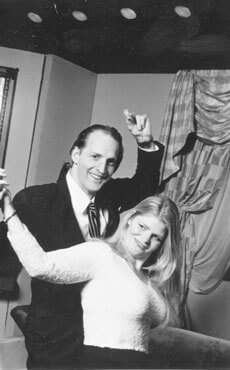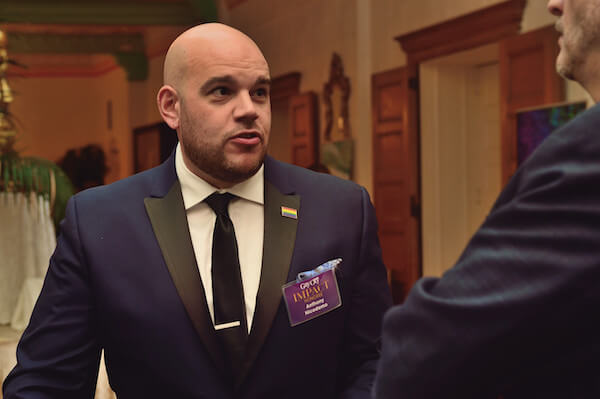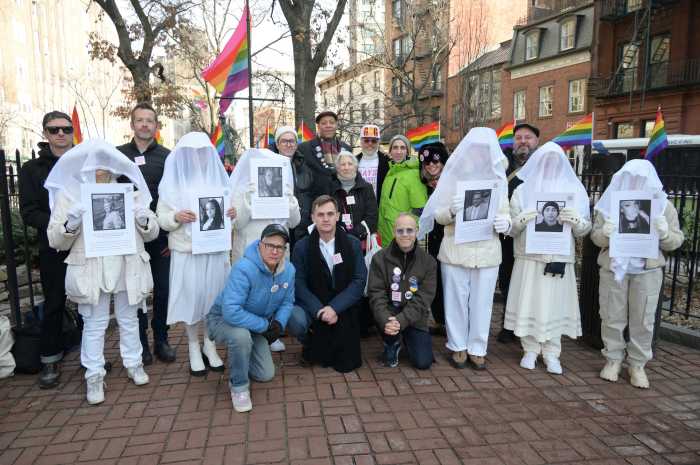Strauss spin-off may be implausible, but the singing is a hearty balm
Re-imagining Strauss’ quintessentially light opera “Die Fledermaus” as an even lighter tale of New York City’s social scenes, club life, and bohemian pretensions is, at the very least, a silly and highly esoteric undertaking. The only thing more odd is how entertaining and engaging the end result was in its recent staging at Wings Theatre.
In “Tales from the Manhattan Woods,” the new book and lyrics by Frederick Stroppel are uneven, at times goofily inspired, but taken as a whole the score works in ways that one would not expect. There is an overriding wit at work that is bigger than the individual jokes and if Stroppel sometimes forces a rhyme or a joke, the buoyancy of the evening—not to mention the undertaking of what is easily a monumental task—renders moot most criticism.
You either relax and enjoy this show or you nitpick away at its faults. When in doubt, if you take the former course you probably find yourself delightfully amused.
Stroppel has maintained the names of the characters and the tale of intrigue, infidelity and hidden identity seems a little more superficial, if that’s possible, when rendered with contemporary trappings. For instance, Adele, who is the classic minx of a maid to Rosalinda, a lady of fashion in the original, becomes a beaten-down assistant to a professional woman in a velour tracksuit, the one more manipulative than the next. The entire first scene, in fact, seems like “The Devil Wears Prada” meeting “I Love Lucy.”
The story of a husband’s philandering exposed to his wife at a masked ball while he shamelessly flirts with her is so substance-free as to be a trifle. If the plot in Stroppel’s version is convoluted and the characters motivations’ at times incongruous, it’s only because that mirrors the original version. “Die Fledermaus” never pretended to be fine art.
The performances by the superlative cast are what really made this show work. The major roles were triple-cast, just like at the Metropolitan Opera, and the singers were vocally and comedically sensational, a rare combination that made the entire evening, even the less pointed parts of the script, fresh and lively.
In particular, Melanie Melcher as Adele, the assistant who wants to be part of the downtown art-and-party scene, was consistently delightful. Her clear voice and dead-on comic timing were pure pleasures. In the perilously close quarters of the Wings Theater, Melsher scored every acting moment and her flexible, clear voice was nothing short of exciting. Her second act aria, in particular, was remarkable, showcasing a tremendous range and a facility of expression that is delicious.
Similarly, Karen Coker as Rosalinda was equally adept and her singing every bit as accomplished. Indeed, the evening’s highlights came when the two women were on stage together.
As Eisenstein, Rosalinda’s philandering husband, (recast as a real estate mogul sent to jail for assaulting a photographer, thus tempting Rosalinda to have a fling with her old lover, Alfredo––emblematic of the plot complications at hand) Steven Snow was in fine voice. Gideon-Dabi as Falk, Eisenstein’s p.r. guy, who for reasons unknown wants Rosalinda to discover Eisenstein’s infidelities, was charming if one of the stiffer performers in the ensemble. Kevin Kash in the comic role of Stosh, who in this production is a low-ranking police officer, added just the right touch of offbeat humor to the final act, though he never sings.
Musical director Stephen Phebus was perhaps the hardest-working member of the ensemble, playing the piano adaptation of the score with seemingly limitless energy.
Heaven only knows what possessed Stroppel and the Wings Theater to undertake this project. Even light opera is a rarefied taste and not typically crowd-pleasing entertainment. Yet given the fun and sheer entertainment of the evening—once more demonstrating New York’s rich supply of talent—one is very glad they did.




































